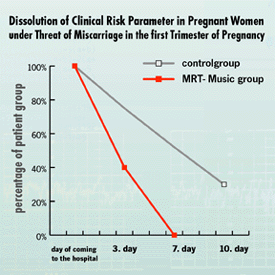The women were brought to the university hospital with great pains in the abdomen and ultrasound diagnoses showed that their pregnancy was at risk. The reasons for the danger reached from environmentally caused stress situations over nervous mental tensions up to hormonal deficiencies.
We built two groups, an experimental group and a control group. In the first two days all patients of both groups underwent complex hormonal investigations and the hormone levels of cortisol, progesterone and estradiol in blood as well as the kariopicnotic hormone index were determined.
On average the patients were 23 years old (± 3,1). For seven of the women it was their first pregnancy, eight were pregnant for the second time. The kariopicnotic index was determined every 3rd day.
The hormone levels in blood were determined every morning between 8 and 10 o’clock before and after the treatment while the kariopicnotic index was determined every third day. The evaluation of the mental state was made by the help of the Minnesota Multiphasic Personality Inventory (MMPI), the first evaluation before starting with the treatment and the second evaluation after finishing the treatment.
We built two groups, an experimental group and a control group. In the first two days all patients of both groups underwent complex hormonal investigations and the hormone levels of cortisol, progesterone and estradiol in blood as well as the kariopicnotic hormone index were determined.
On average the patients were 23 years old (± 3,1). For seven of the women it was their first pregnancy, eight were pregnant for the second time. The kariopicnotic index was determined every 3rd day.
The hormone levels in blood were determined every morning between 8 and 10 o’clock before and after the treatment while the kariopicnotic index was determined every third day. The evaluation of the mental state was made by the help of the Minnesota Multiphasic Personality Inventory (MMPI), the first evaluation before starting with the treatment and the second evaluation after finishing the treatment.
Medical Resonance Therapy Music®
Group
For 8-10 days 15 patients received every day for 30-60 minutes a treatment with the Medical Resonance Therapy Music® via compact disc and headphone and received no other treatment.
Already after 2-3 days of treatment with Medical Resonance Therapy Music® the risk parameters for loosing the child were gone in 60% of the women. In the time of day 5-7 they disappeared also in the remaining 40% of the patients.
Control GroupFor 8-10 days 15 patients received every day for 30-60 minutes a treatment with the Medical Resonance Therapy Music® via compact disc and headphone and received no other treatment.
Already after 2-3 days of treatment with Medical Resonance Therapy Music® the risk parameters for loosing the child were gone in 60% of the women. In the time of day 5-7 they disappeared also in the remaining 40% of the patients.
In this group 15 women did not listen to MRT-Music® but received hormone drugs, sedatives, spasmolytica and physiotherapy.
After 7-10 days of treatment the clinical risk parameters for loosing the child were gone in 70% of the women in this group.
Investigators:
Prof. Dr. med. G. Gerassimowitsch
Prof. Dr. med. Walentina Sidorenko
Dr. med. Swetlana Scheleg
